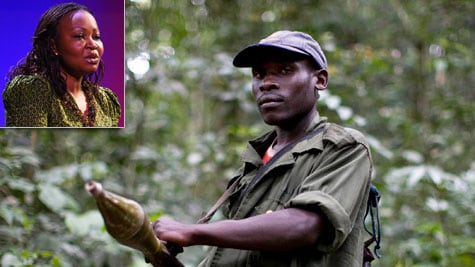
This morning I opened a horrifying email from Annie Rashidi-Mulumba, a remarkable Congolese activist and human-rights lawyer who spoke at The Daily Beast’s Women in the World summit in March. In her note, she shared devastating news about members of her organization.
“We are really suffering and need your help!" Annie wrote. "I am just coming back from home, where I had very depressing news from my local community. Two of our staff were abducted by Ugandan rebel groups. One managed to escape and the other one was killed after the rebels chopped off her lips and ears.”
Please read Annie's account below. If you'd like to help, contact Annie's organization, Groupe Lotus.
It is almost impossible to describe the level of suffering and despair in the rebel-controlled territories of the Democratic Republic of Congo. As I write this piece, I just received news that between April 2 and 3, the Lord’s Resistance Army carried out a horrific attack in the northeastern Congolese village of Sambia, ensnaring two volunteers for my organization Groupe Lotus. One of them was raped, tortured, and murdered.
On Friday April 2 at around 11 p.m., rebels invaded Sambia and began looting shops and severely beating villagers. The next day, on their way out of town, they abducted 12 civilians, including our two staff members, a woman and a man.
The Congolese population is pleading for the United Nations to conduct a more thorough assessment of how U.N.-backed military operations risk civilian lives.
My male staff volunteer managed to escape after four days of captivity. He told us the captives were forced to wash the rebels’ uniforms and cook for them. They were tied to each other with cords, even when they were sleeping. Each day, they walked more than 12 miles; the LRA killed people who where slow. All seven LRA members repeatedly raped all the women captives.
Our staff volunteer managed to escape as his captors met up with another group of LRA, who arrived from a neighboring town with an additional 30 abductees. In the confusion, five people attempted an escape. Two of them succeeded, but the rebels found and killed our female volunteer and two other victims. Before killing them, the LRA cut off their lips and ears for not obeying “orders.”
Here’s another story I recently heard: In Ituri province, a pregnant woman was killed after she was brutally raped and burned alive with petrol. This kind of story is so common. I feel depressed, but strangely enough, the depression gives me more strength to fight. I say to myself, “If I stop fighting, who else can fight for us?”
In rebel-controlled territories of the Congo, people live in a state of permanent terror. In most cases, rebels use similar tactics to conquer villagers, establishing full control of any natural resources in the area: First, they pretend to act on behalf of the population, reassuring them in their local language. Then, once they manage to win the loyalty of enough people, they begin to kill and gang rape men, women, and even babies in public places such as markets, water points, or schools. Their goal is control through terror.
According to a Human Rights Watch report released last month, “321 Congolese civilians were killed by the Ugandan rebel Lord’s Resistance Army and 250 abducted, including 80 children, during a rampage in the Makombo area of northeastern DRC in December 2009.”
It is no news that these atrocities are committed not only by rebels, but also by government forces. Former rebels from the Congrès national pour la défense du peuple (CNDP) , who are currently heading the 212th national army brigade, have used their “new” position to exercise control over mining sites. The CNDP rebel group converted into a national army in early 2009 when the Congolese government, with the support of the United Nations, allowed the Rwandan army, in a joint military operation into North Kivu, to track and chase the Hutu rebel group, known as the Democratic Forces for the Liberation of Rwanda (FDLR).
Unfortunately the Rwandan support brought more problems than solutions. The killings and brutal sexual violence against women, men, and children have massively increased. This was highlighted in an Oxfam report: “Since the start of [the joint] military operations, the FDLR rebels have carried out widespread retaliatory attacks, brutally killing and raping Congolese civilians. In one recent reprisal attack, on July 20, 2009, the rebels killed more than 20 civilians in the village of Manje, in Walikale territory, North Kivu province. As in previous similar attacks, the rebels hacked some victims with machetes, shot others, and burned a number to death in their homes.”
When the CNDP militia joined the national army and settled in North and South Kivu provinces, they also occupied and administered mine sites. They have used weapons to extort taxes and minerals from local diggers and traders, reaping profits worth millions of dollars a year, while retaining their corrupt and violent political agenda.
The local population in the Congo will continue to suffer sexual massacres and other grave human-rights violations unless the Congolese government and international donors, including the United Nations, implement a comprehensive strategy which tackles once and for all the economic drivers of this 13-year conflict. The Congolese population is pleading for the United Nations to conduct a more thorough assessment of how U.N.-backed military operations risk civilian lives. We hope for concrete action by the U.N. and Congolese government to mitigate such risks, with specific attention to protecting women and girls from rape.
Given the history of the Congo, however, it seems quite ironic to simply rely on political or foreign aid to end this conflict without calling on the Congolese vox populi to express its frustration and become part of the solution. When we Congolese men and women stand our ground and say “enough is enough,” then something might finally be done to end the sexual massacre of women and babies in our country.
It is obvious that the Congolese politicians in the capital city, Kinshasa, are still in a state of denial about the massive and systematic human-rights violations that occur on a daily basis in the eastern part of the country. But voices are rising from the shadows to denounce the government’s inaction.
Very recently, and as a result of the The Daily Beast’s Women in the World summit, two marches were organized in Bukavu and Kinshasa. The march in Bukavu, facilitated by Panzi hospital founder Denis Mukwege and his staff, gathered more than 30,000 men and women on the street to protest against impunity for rape. Meetings and demonstrations in Kinshasa were initiated by Senator Eve Bazaiba, who managed to gather political groups from all the provinces alongside key human-rights organizations. They called on the government to stop the blood mineral business and boycott mining companies that are contributing to the sexual violence. They demanded that corporations be held accountable for their involvement in the extermination of the innocent souls of Congo.
However good-intentioned these few actions are, so much has yet to be accomplished in comparison with the millions of deaths and rape cases that affect almost every family in the Congo. In spite of everything, our families have only two wishes: First, to see the end of this everlasting conflict, and second, to ensure that this nightmare never happens again.
Get Involved: Annie Rashidi-Mulumba’s nonprofit, Groupe Lotus, serves war victims in northeastern Congo.
Tina Brown is the founder and editor in chief of The Daily Beast. She is the author of the 2007 New York Times bestseller The Diana Chronicles. Brown is the former editor of Tatler, Vanity Fair, The New Yorker, and Talk magazines and host of CNBC's Topic A with Tina Brown .
Annie Rashidi-Mulumba is a consultant on human rights for the United Nations, focusing on refugees in West Africa. She is a board member of Groupe Lotus, a nonprofit that serves war victims in the northeastern part of Congo.







